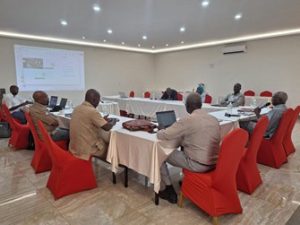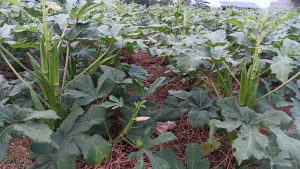RWANDA: TAAT rallies stakeholders on building sustainable seed sector for food systems transformation

The Technologies for African Agricultural Transformation (TAAT) Programme has underlined the urgent need to build robust and sustainable seed systems that will support the consistent production and delivery of adequate quantities of high-quality seeds to farmers across Africa.
The head of the TAAT Clearinghouse, Dr Solomon Gizaw, disclosed this in a keynote presentation at the just-concluded 2nd Rwanda National Seed Congress, held in Kigali, Rwanda, between 29 and 30 July 2024.
Organised by the National Seed Association of Rwanda (NSAR) in collaboration with the Private Sector Federation and the Government of Rwanda, under the theme “Rwanda Seed Industry Modernisation”, the event brought together national, regional and global researchers, policymakers, academia, seed companies, Non-Governmental Organisations (NGOs,) Development Partners and financial institutions, both private and public officials to discuss and share knowledge on seed systems modernisation and trade.
The congress featured robust presentations and discussions on strategic interventions to ensure sustainable and resilient seed systems, building around the recent advancements and available technologies in Africa.
Stakeholders opined that the seed sector in Africa is plagued with serious weaknesses that render it ineffective in catering to agriculture’s overall needs. As food and nutrition security is heavily dependent on seed security, the goal of food and nutrition security will remain elusive unless seed security is assured for farming communities.
Therefore, the management of the seed sector is of paramount importance. Stakeholders agreed that the basic requirement in a seed system is that good-quality seeds should be made available in locations where they are required. Farmers should have access to and be able to utilise them properly to achieve the required output.
In his presentation, Dr Gizaw lamented that the availability of productivity-enhancing technologies has not translated to increased crop productivity in Africa. Noting that access to improved varieties and high-quality seeds, which form the fulcrum for increased crop productivity, remains low.
To address this, TAAT, according to him, prioritises supporting countries in building and strengthening their seed systems by mobilising political will and creating an enabling environment to increase access to quality seeds of improved crop varieties across the continent.
“TAAT’s support begins with conducting seed assessments to determine constraints to effective and functioning seed systems in countries. Following the assessments, TAAT provides recommendations related to the following components of the seed system: breeding, variety release and registration, early generation and certified seed production, distribution and market, farmer demand and awareness,” Dr Gizaw said.
“TAAT also supports countries in developing seed roadmaps that will enable them to meet their seed production targets while linking them to African Development Bank (AfDB)-financed agricultural investments to accelerate the production and delivery of Early generation seed (EGS) and the certified seed of high yielding, climate-resilient and nutrient-dense varieties,” he added.
Dr Gizaw says these investments include major Africa-wide agricultural initiatives financed by the bank and other International Finance Institutions (IFIs).
According to him, TAAT’s support to countries that benefit from the African Emergency Food Production Facility (AEFPF) is a noteworthy example. AEFPF is a US$1.5 billion African multi-country emergency programme financed by the AfDB to strengthen seed systems. It targets increased production of cereals and oil grains to mitigate food shortages arising from disrupted supply chains due to the Russia-Ukraine conflict.
He added that TAAT’s seed systems work also creates an enabling environment for a well-functional seed sector which involves supporting countries to increase access to quality seeds through accreditation of seed suppliers, assess seed policy and regulatory environment and advocate for reforms, advocate for regional harmonization of regulations for technology release and registration, and capacity building of certification agencies and national seed associations.
In recognition of the private sector’s crucial role in deepening seed sector transformation, Dr Gizaw highlighted TAAT’s collaboration with the African Seed Trade Association (AFSTA), which birthed the African Cereal and Legume Breeding Consortium (ACLBC).
“The consortium seeks to enable more than 200 seed companies to access high-yielding and superior CGIAR varieties or hybrids in a well-defined licensing arrangement and assist seed companies in developing their varieties or hybrids and conducting multi-location adaptability tests of new varieties/hybrids,” he said.
“ACLBC will equally strengthen the capacity of seed companies in hands-on seed production and maintenance techniques with an emphasis on hybrids and conduct joint demonstrations to showcase and promote high-performing TAAT-vetted CGIAR varieties or hybrids,” he added.
To conclude his presentation, Dr Gizaw rallied all stakeholders to ensure accelerated adoption of seed policies and regulatory reforms across the continent, the development of seed roadmaps linked to large-scale agricultural investments primarily financed by IFIs, and strengthening the capacities of National Agricultural Research and Extension Systems (NARES) and private seed companies to accelerate and ensure the production and delivery of Early Generation Seeds (EGS) and certified seeds sustainably.
The 2024 edition of the Rwanda National Seed Congress recorded 240 participants drawn from the regions of Africa, Europe, Asia and the Americas.
The congress attracted key stakeholders such as the AfDB, Food and Agriculture Organisation (FAO), International Seed Federation (ISF), International Seed Testing Association (ISTA), the International Union for the Protection of New Varieties of Plants (UPOV), African Seed Trade Association (AFSTA), and the African Agricultural Technology Foundation (AATF).
The Congress was pivotal in providing a platform for stakeholders from the public and private sectors and development partners to unite and agree on transformative actions for the seed industry’s improved performance and sustainable development.
To modernise the seed value chain, it was emphasized that stakeholders must collaborate under the principles of co-responsibility and solidarity. This approach is crucial to ensuring sustainable seed production and distribution, ultimately supporting farmers’ prosperity, which should be central to all actions and policies.
Recent Stories
Related Stories
- AFSTA 2025: TAAT advocates Innovative Seed System Models to unlock Opportunities for SMEs
- TAAT and partners elaborate Sweet Potato Roadmap for Rwanda
- From e-catalogs to country engagement: How TAAT is deploying digital tools for Data-driven Agrifood Transformation
- TAAT to showcase food systems transformation initiatives at African Food Systems Summit 2024
- President Adesina commends TAAT e-catalogue







